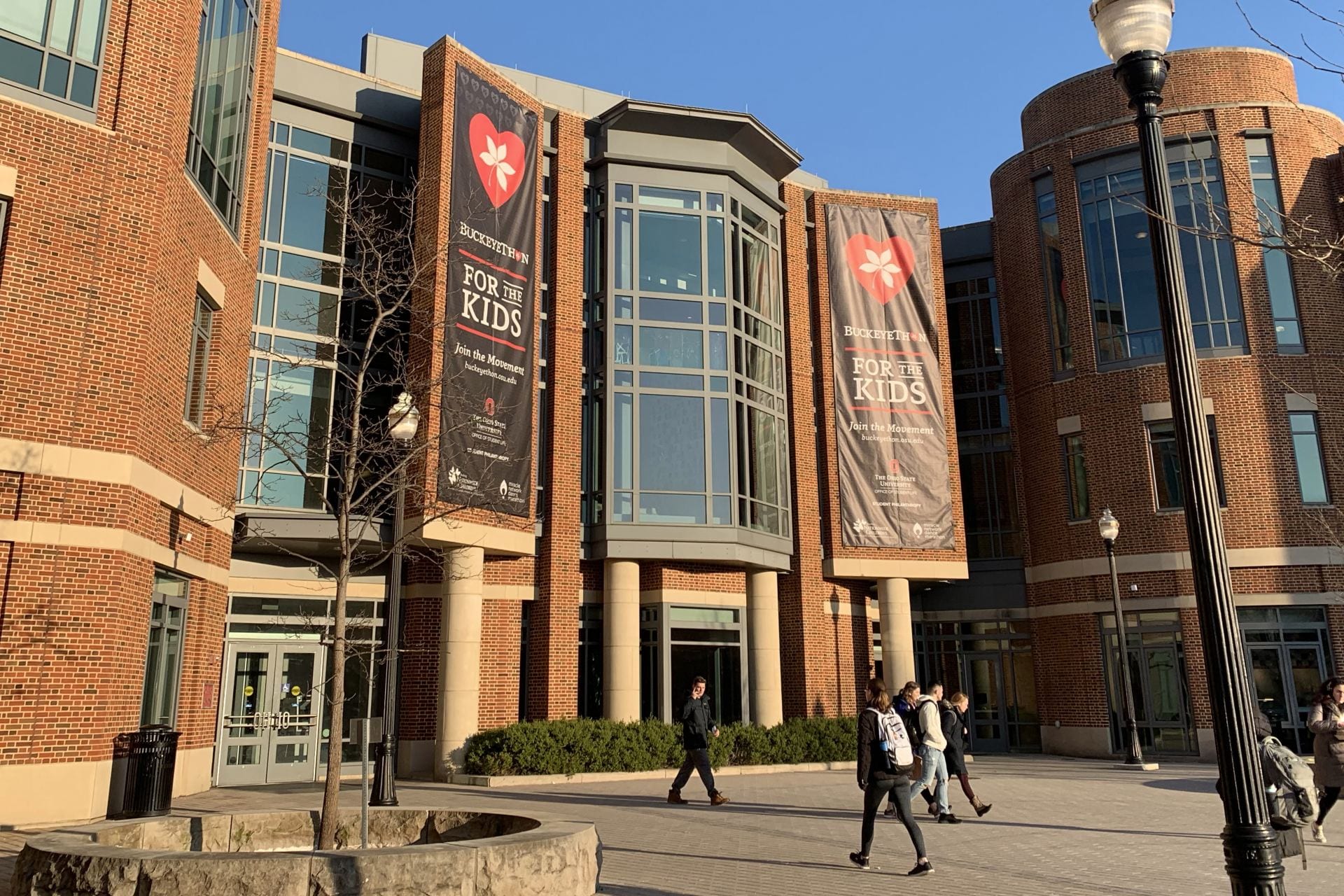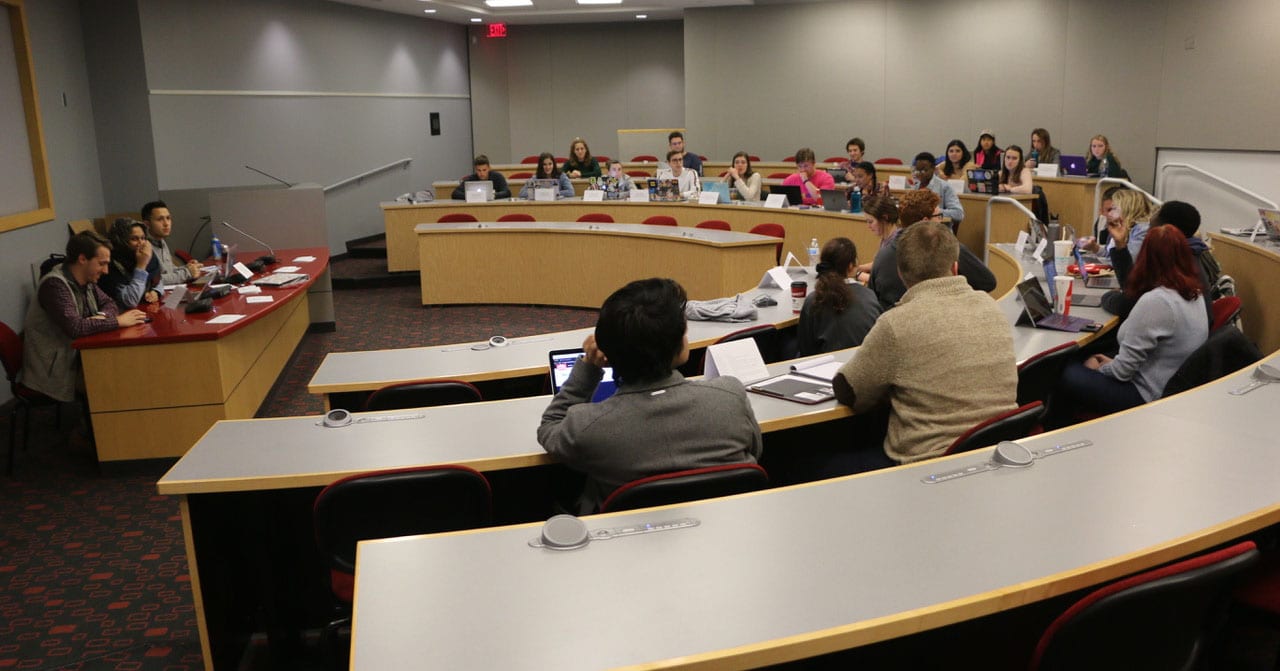
The Undergraduate Student Government meeting on Wednesday. Credit: Torrance Lang | Lantern Reporter
The Undergraduate Student Government’s regular meeting last night featured something that wasn’t on its agenda — an upset student who said he wasn’t given a clear answer why his senator application was denied — and an unusual response from the assembly’s speaker.
During the public forum section of the Undergraduate Student Government General Assembly meeting, Mason Bindemann, a third-year in accounting, addressed the assembly for not being considered to serve as a senator by the steering committee.
“I recently applied to fill a general assembly vacancy, but I was never even brought to the floor for consideration,” Bindemann said. “I’ve asked multiple members of the steering committee for feedback, including parliamentarian [Rayvon] Braziel, who served on my [resident advisor] staff last year. To date, I’ve received no substantive reply.”
Bindemann said Speaker Terrell McCann, a third-year in business administration, denied his application due to a competitive process. Bindemann then addressed the assembly, asking if the following information makes his application uncompetitive.
Bindemann recounted his involvement with USG and other organizations on campus.
“I’m the founder and president of Lanarchy, a gaming organization I built from scratch,” Bindemann said. “We have over 450 members and average 25 attendees weekly. Last year, I served as a resident advisor. I’m currently a Fisher peer mentor, helping first years find their footing. One of those mentees is now founding the first Central Asian identity org on this campus, partially because I encouraged her to.”
Bindemann then explained that he co-authored a piece with former General Assembly member Mohammed Ahmed and was “a whistleblower who brought [the USG] election crisis to Emma Pettit,” a higher education reporter at the Chronicle.
Pettit wrote a story this September describing the Spring 2025 USG election that featured candidate disqualifications, election bylaw violations and an unprecedented new election held Sept. 17 through Sept. 19 this year.
Bindemann has been outspoken about the last year’s administration, submitting an opinion article to The Lantern criticizing the judicial panel.
During his remarks, Bindemann said McCann had told him to apply. He said Braziel offered no response on why he was not selected despite asking for feedback.
“I applied for a vacancy,” Bindemann said. “Now I ask those same people, the ones who supported my words, are you the ones who deny me now?”
Bindemann left before the assembly could respond.
After the address, McCann said that he is going to “address something from the chair that [he] doesn’t usually do,” referencing Bindemann’s remarks. McCann said that he wants to clear the record after Bindemann’s “attempt to undermine [himself], [his] parliamentarian, [his] secretary, any of [his] LCS or [his] senators.”
McCann said that the steering committee worked hard when it came to filling the vacancies, and that there will always be transparency when it comes to selecting people to serve.
“The committee did its work,” McCann said. “The steering committee operated within the bounds of the organizational and standing rules of the General Assembly. The work is now finished, and here we are to present these folks who the steering committee has approved and brought to the floor.”
McCann said that he understands some students may be upset that their applications were not approved by the steering committee, but there were around 50 applicants for the vacant seats.
“Just because you disagree with it, doesn’t mean that it was unfair,” McCann said. “[It] doesn’t mean that it was right or it was not right.”
Over email, Bindemann offered more insight about his speech and quick exit, saying that he didn’t want to put a spotlight on the steering committee in front of new members.
“I didn’t think it would be fair or constructive to put the committee on the spot in front of the entire GA,” Bindemann said. “But I did feel it was important for the broader Assembly to hear how lack of feedback from the Steering Committee can make applicants feel.”
Bindemann also said that he has been told of the response from McCann after he left.
“I’ve since been told that Speaker McCann, after I left, reportedly said ‘undermining USG will not be tolerated,’” Bindemann said. “I’d respectfully ask him to point to a single line in my remarks that did so. My comments came from a belief in the institution, not a desire to tear it down.”
Braziel acknowledged the frustration from rejected candidates, but said the committee did its job when it came to selecting senators, keeping in mind what would be beneficial for the chamber as a whole.
“Those are the decisions that were made,” Braziel said. “We made the decision to safeguard the chamber at large, and we stand by our decisions, regardless of what [others] might like or what they might have wanted.”
Mekateko Mathebula, a fourth-year in economics, also addressed the assembly, advocating for the Association of Big Ten Schools.
The association gathers student governments from 14 Big Ten schools to talk about different initiatives and priorities each body plans to work on during the school year.
“At these conferences, we share ideas and ways to improve the college experience for every student on campus,” Mathebula said. “I also think that the students gain a way of networking and inter school collaborations as well.”
Mathebula said that with USG’s and student participation, people will be encouraged to go and share their feedback about how the university can improve student experiences.
Once public forum ended, the assembly went into voting, unanimously passing the bill for USG to attend the association’s conference in November.
The Assembly then went into a five-hour executive session where they confirmed 13 senators, filling the rest of the vacancies for the general assembly.

